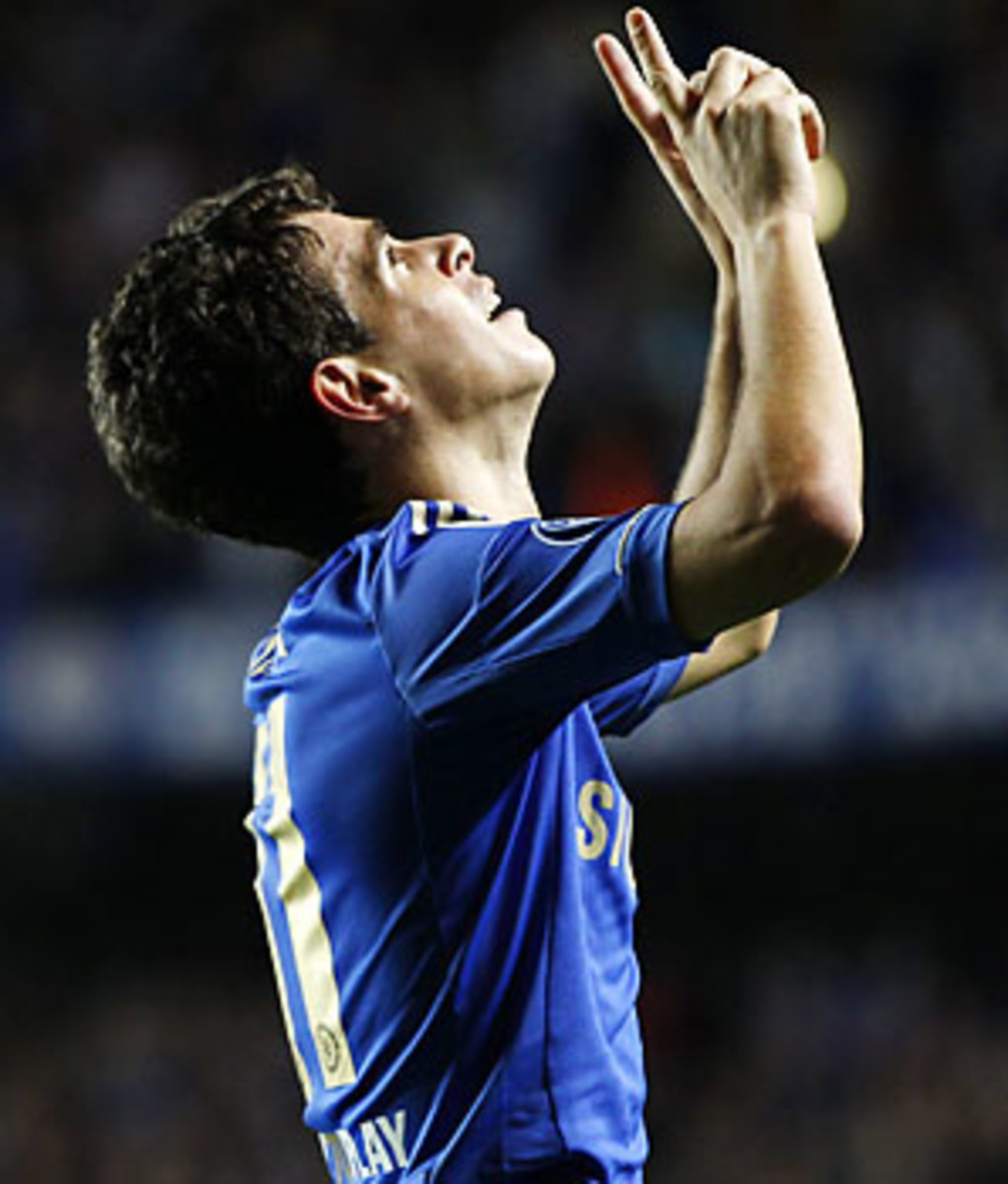Oscar shines, but Chelsea's defense breaks in draw with Juventus
LONDON -- Sooner or later people are going to start believing in Oscar's genius. Last year, in extra time in the final of the Under-20 World Cup in Bogota, he floated a chip from wide on the right over Portugal goalkeeper Mika to complete his hat trick and give Brazil a 3-2 victory. It was, everybody agreed, a sensational goal -- if he meant it. He insisted he did, but there was doubt: could anybody really, in the heat of the game, have had the vision, the audacity and the control to execute such a shot?
It was a similar story at Stamford Bridge on Wednesday, a 2-2 draw between Chelsea and Juventus. His first goal was fortuitous, a deflected drive from just outside the box when Arturo Vidal was off the field receiving treatment for an injury; his second was jaw-dropping. As the ball was played to him by Ashley Cole, he had two men on him. Others might have looked for a free-kick or sought to hold the ball up; he backheeled the ball one side of Andrea Pirlo, ran round the other and, on the turn, whipped a dipping, curling shot into the top corner. Did he mean it? It was so unexpected, such an unusual movement, that the immediate assumption was that he had not -- but nobody, surely, could have reacted that quickly to a miskick.
Even if that first touch had been inadvertent, the finish was breathtaking, but so smooth was his movement, so in control did he seem, that the conclusion had to be that he had meant it. That there was widespread incredulity was testimony to the improbable brilliance of the goal. Oscar is just one of those players capable of finding something unique even in a sport that is 150 years old. For him, the improbable is always possible.
What made his performance all the more remarkable was that this was his first start; the assumption had been that Juan Mata would be given the central role which, against Juventus, is not merely about creativity but also about preventing Pirlo, operating at the back of midfield, from dictating the rhythm of the game. He did that superbly, less through any great defensive ability of his own than by making Pirlo defend. "He did a perfect job tactically," Chelsea manager Roberto Di Matteo said.
This is the new Chelsea, the attacking, vibrant team that has emerged this season from the muscular organization that characterized it last. It's more aesthetically pleasing and it scores goals -- but the problem is that it concedes them as well. Di Matteo has spoken already this season about the need to find "balance" between the attacking flair and defensive resolve, but whenever it has come up against a team that has attacked it, it has looked vulnerable.
The obvious downside of the new formation is that Hazard, on the left of the trident, constantly drifting inside, is rarely in a position to track his fullback. Against a side that plays three at the back, that problem is exaggerated given that the wing back starts higher up the pitch. Stephan Lichtsteiner, the Juve right back, thus had the run of the Juve right flank. There were occasions when he picked up the ball in space and, even more troublingly for Chelsea, times when Chelsea left back Ashley Cole's movement to close him down created a space between himself and John Terry, the left-sided center back. It was that space Claudio Marchisio ran through when he was denied by Petr Cech after 21 minutes and that space Mirko Vucinic ran into as he seized on Vidal's through-ball only to shoot wide. It was down the right as well that Vidal created the chance from which Mauricio Isla clipped the bar late on.
A glance at the heat maps shows the problem clearly: while Hazard's movement was concentrated on the left, it covered the entire width of the pitch; Ramires, by contrast, was so restricted to the right-hand side that he didn't register on the left half of the pitch at all. To an extent it's a trade-off: is what Hazard offers in his free role as an attacking force worth more than the potential defensive flaw that causes? But equally Hazard could be better supported: it's up to the left-sided of the two holding midfielders, that is Frank Lampard, to provide cover; that he couldn't is perhaps a reflection of his relative inexperience in the position.
Juventus' midfield three took up a similar shape to Real Madrid's against Manchester City, with Pirlo allowed to create behind two more aggressive players, Marchisio and Vidal. Although Oscar largely subdued Pirlo, with Mirko Vucinic dropping back and the two wing backs finding space (although Kwadwo Asamoah, dogged by Ramires, had far less space on the left than Lichtsteiner had on the right), Juventus at times swamped the back of Chelsea's midfield and when it did get a flow of passes together, it regularly found a spare man.
That was what led to Vidal's goal seven minutes before halftime, but the Juve equalizer was down to individual errors. First Mikel John Obi lost possession, failing to make any effort to win the ball back, then, as Marchisio slid the ball through, John Terry made a misguided effort to play offside, leaving Fabio Quagliarella to slip the ball through Petr Cech's legs. "We should have dealt with it better," Di Matteo said. "There was no pressure on the ball."
Although Di Matteo spoke of being "disappointed and deflated" at letting a two-goal lead slip, the truth is this could have been far worse. Juventus was much the more threatening side, particularly after halftime and, but for the brilliance of Oscar, Chelsea could easily have lost. Di Matteo may be aware of the problem of balance, of finding ways to cover for Hazard, but he seems no nearer to solving it.






